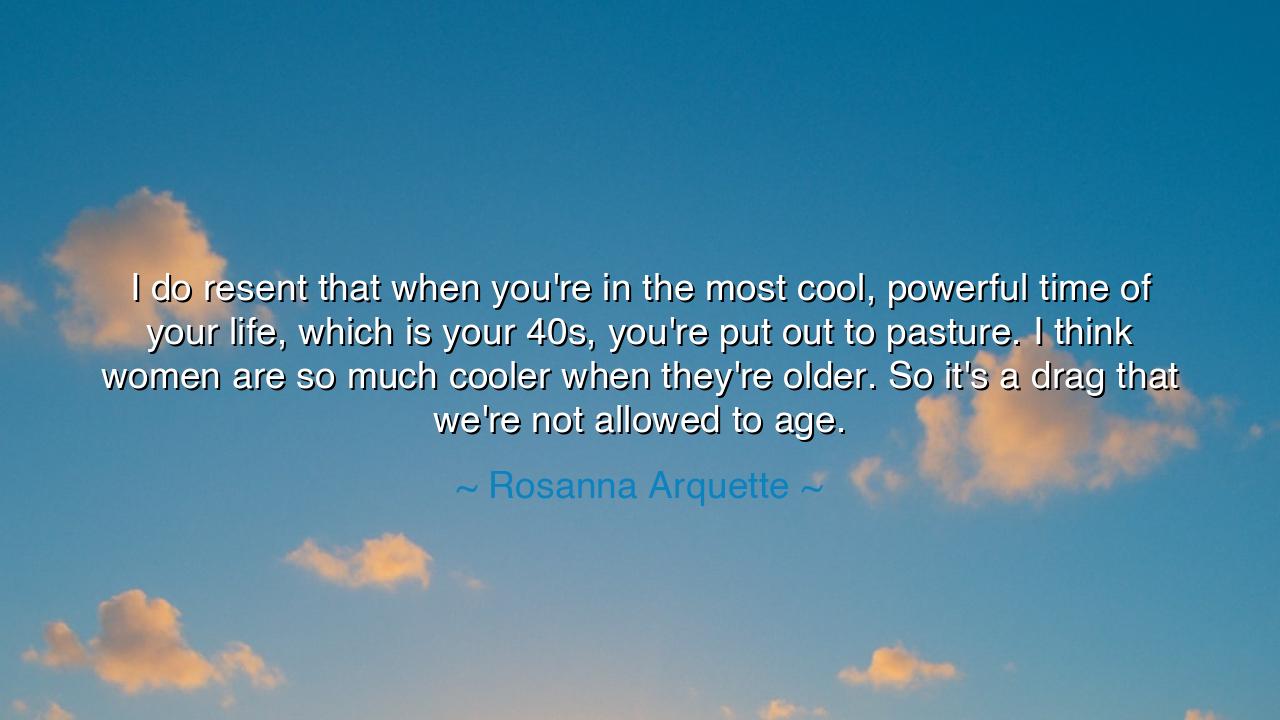
I do resent that when you're in the most cool, powerful time of
I do resent that when you're in the most cool, powerful time of your life, which is your 40s, you're put out to pasture. I think women are so much cooler when they're older. So it's a drag that we're not allowed to age.






In the words of Rosanna Arquette, we hear a lamentation that echoes across generations—an expression of the frustration felt by many, particularly women, as they age in a society that often devalues them in their later years. Arquette’s reflection is poignant: when women reach the most powerful and fulfilling time of their lives—her 40s—they are often treated as if they are no longer relevant, as if their worth diminishes with age. This societal rejection of the older woman’s power, beauty, and wisdom is a tragedy, one that reflects a misguided view of aging. For Arquette, the truth is clear: women, like fine wine, grow even more compelling as they age. Their wisdom, their experiences, and their depth only increase with time, yet society continues to push them aside when they should be celebrated.
This idea of valuing the older woman is not new, but something the ancients understood deeply. In the culture of ancient Greece, the concept of wisdom and age was revered. The philosopher Socrates, though famously depicted as a wise old man, often conversed with older individuals in his search for knowledge. He recognized that age brought with it not just experience but an evolving depth of insight that younger generations lacked. Similarly, in ancient Rome, Cicero celebrated the idea of growing into one’s fullness over time, emphasizing that it is in the later years that virtuous citizens come to understand the true meaning of justice and wisdom. These ancient thinkers didn’t see age as something to be feared or dismissed but as a natural progression that gave an individual the ability to contribute more profoundly to society.
Consider the example of Hildegard of Bingen, a 12th-century abbess, writer, composer, and mystic who flourished well into her 70s. Hildegard didn’t fade into obscurity as she aged; instead, she became more influential, composing music, writing theological works, and advising kings and popes. In fact, her later years were the most productive and powerful of her life. Hildegard embodies the notion that with age comes clarity and strength, and her legacy stands as a testament to the power of embracing maturity rather than fearing it. In her, we see the ancient truth that wisdom becomes more profound as one lives through the trials and joys of life, and her work remains relevant to this day.
Arquette’s frustration at the treatment of women as they age is also a reflection of a societal imbalance—one that values youth over wisdom, beauty over depth, and novelty over experience. The ancient Egyptians understood the value of maturity in leadership. Queen Hatshepsut, for example, ascended to power at the age of 50, when most women in her time would have been seen as past their prime. Yet, she ruled Egypt with great strength, overseeing monumental architectural projects and leading her people to prosperity. Hatshepsut, like Arquette’s ideal of older women, embodied the fullness of life and leadership, proving that true power grows and refines with age.
The lesson here is clear: aging, especially for women, should not be viewed as a period of decline but as a time of growth, refinement, and increased strength. Arquette’s words call upon us to reclaim the value of growing older and to honor those who are in their prime years, not just for the experience they offer but for the wisdom and depth they embody. This is not just a societal issue but a deeply personal one. Just as the ancients recognized the power of the elder—in leadership, in philosophy, and in culture—so too must we honor the roles of older women, who hold the key to building a richer, more compassionate world.
In our own lives, let us embrace the wisdom that comes with experience. Whether we are younger or older, we must honor the contributions of those who have lived through the trials and triumphs that define us. Let us not dismiss those who have gone before us, but learn from them, celebrate them, and value their ongoing contributions. In every age, there is something unique and valuable that can only be offered by those who have had the time to grow, to reflect, and to perfect their craft.
The practical action we can take is to change the narrative around aging, particularly for women. We must reject the superficial standards of beauty and youth and embrace a more holistic view of life. Let us celebrate not just the outward appearance of age, but the depth, resilience, and experience that come with it. Older women, like older men, should be seen as individuals who possess the power to shape the future with their wisdom, their experience, and their unique perspective. Let us ensure that every stage of life is honored, not as a decline, but as an ascent toward something greater and more meaningful.






AAdministratorAdministrator
Welcome, honored guests. Please leave a comment, we will respond soon